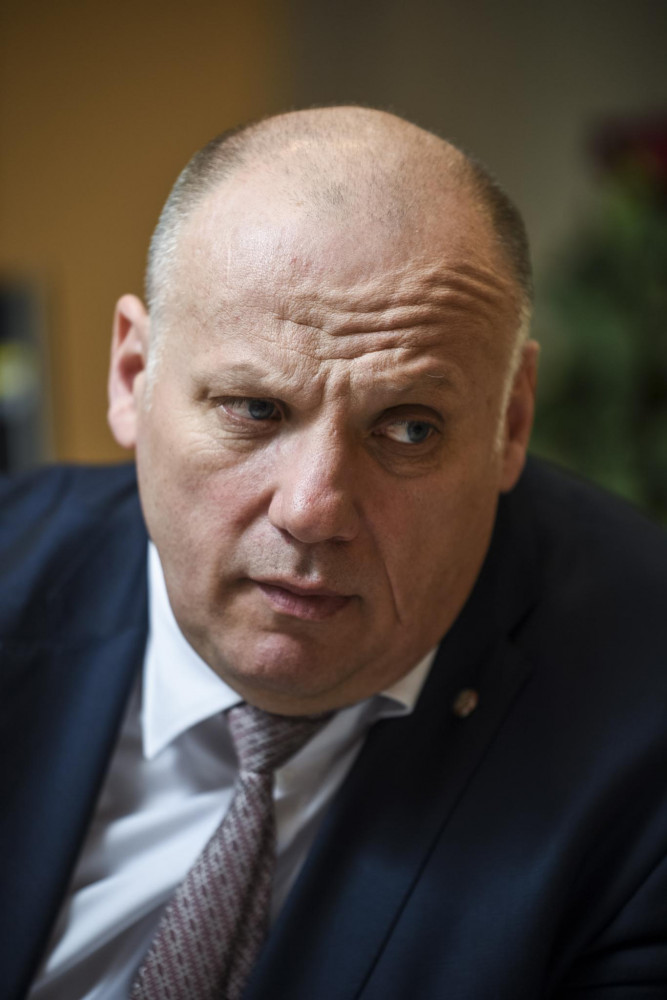Ex-MoD Raimonds Bergmanis: The people of Ukraine are not going to surrender and Putin has underestimated their will

A conversation with Raimonds Bergmanis, Member of the Saeima, former Minister of Defense (ZZS).
Russian President Vladimir Putin has announced the start of a "military operation" in Ukraine...
War has begun, and we can only hope that it will not turn into a world war. Because the way it is going at the moment is very reminiscent of the way the Second World War started, and Russia is acting very much like Nazi Germany.
What could Putin's motives be - does he want to conquer the whole of Ukraine or just part of it?
Nobody knows. The whole escalation of events, the US intelligence reports and analysis of them, suggested that it might happen, but people tend to hope for the best. Unfortunately, the reality has followed a very bad scenario: the war has started.
Ukrainian infrastructure is being bombed with missiles. Does this mean that after that there will then be airstrikes and bombing, and then a ground attack? How far will Russia go?
There is little information yet on what is happening. It is difficult to say what the objectives are. It is clear that what is being reported by Russian propaganda is a lie. What Putin's main objective is, what he wants to achieve, cannot even be gleaned from what he says.
But something can be guessed… The demilitarization of Ukraine, for example. What do such terms mean?
There is no demilitarization.
Perhaps Putin's aim is to link Crimea with the "republics" of Luhansk and Donetsk. That may be one objective.
Perhaps to cut off Ukraine's access to the sea? That may also be an objective. Perhaps to annex the whole of southern Ukraine and link up with the breakaway Transnistria in Moldova?
There are many possible objectives, but who can know what Putin's objective is?
What can the Western countries do in this situation, apart from sanctions? NATO, after all, is not going to fight against Russia.
There is not enough information on the whole package at the moment, and consultations are still taking place in Brussels. I think there could be a transfer of arms to Ukraine. There will also be sanctions. We will see how strong they are.
Thursday morning has changed the world irrevocably. How are we going to live afterwards? We do not know yet what the sanctions will be - there are only theories about them.
It is likely that there will be sanctions against certain politicians, officials, businessmen, propagandists. Then there is the German Chancellor, Olaf Scholz, who has announced that the certification of the Nord Stream 2 gas pipeline is being suspended.
But Nord Stream 1 is operational...
So, let's see what the sanctions will be - how harsh.
I have the feeling, however, that a new wall is being built and that there will soon be no more cooperation with Russia until there is some solution to this conflict. The situation is very dangerous.
How determined is the Ukrainian army to fight back?
Even when I was Minister for Defense, I saw very great progress in the skills and determination of the Ukrainian armed forces. The last time I was in Ukraine was in 2018. And now even more time has passed. The Ukrainian people do not want to give up, they want to defend their country, and this is perhaps a factor that Putin has underestimated.
But there is a huge traffic jam outside Uzhhorod - lots of people want to leave the country.
This is understandable - civilians want to escape the war, to save their families.
Latvia has had relatively few problems with taking in Syrian and Iraqi refugees, but this time it may turn out that large masses of people could come to Latvia. How prepared is Latvia for this?
That is something to think about, to worry about. If the Minister for the Interior, Marija Golubeva, can say in public that there are other ministries that are opposed to her ministry's refugee reception plan, then one has to ask how this is even possible? Then a meeting - a crisis management council - should be convened immediately, and Prime Minister Krišjānis Kariņš should ask the question: "How can this be?" How can it be that other ministries are objecting to a civil protection plan drawn up by the Ministry of the Interior?
We also need to understand whether the Latvian healthcare system is ready to receive the wounded from Ukraine. All this should be done, and we should think about how we can help.
The government should also think about what steps Russia will take, will it cut off gas and other energy supplies. This needs to be anticipated and there need to be contingencies in place in good time.
